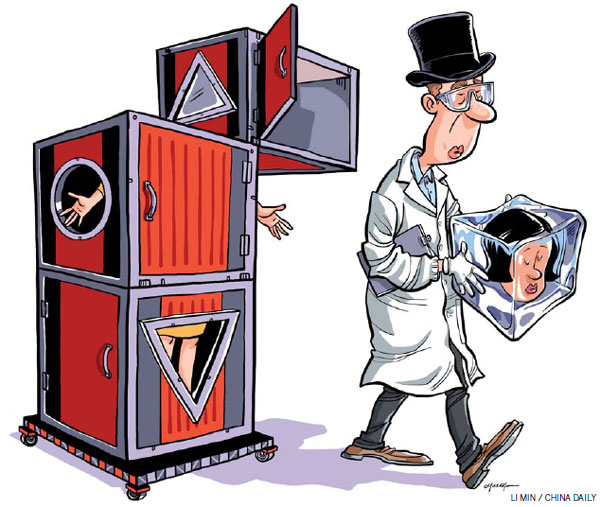Welcome to a mind-boggling possibility
Updated: 2015-10-09 07:21
By Zhang Tiankan(China Daily Europe)
|
|||||||||||

Writer's final mystery: Bets $120,000 on getting her preserved brain revived via future technology
Du Hong, writer of books for children, died on May 30 of cancer. She is back in the news more than three months later because journalists have found she spent $120,000 to have her brain cryopreserved with US-based Alcor Life Extension Foundation in the hope of "coming back to life" with the help of future technology, say, half a century later. Neuro-cryopreservation means keeping a person's brain in liquid nitrogen at about minus 196 C.
The idea of reviving life comes from nature. Certain types of pear trees can lie dormant in winter when temperatures drop to minus 33 C only to resume all life activities after temperatures return to normal; some apple trees can survive even minus 46 C. On some temperate beaches, certain kinds of oysters and mussels freeze in the cold night when temperatures drop as low as minus 30 C and revive with daylight. These plants and animals only minimize metabolism - the process doesn't stop - which means they are still alive.
Du's case is totally different because she is dead while the above-mentioned creatures are not. Her "revival" in the future would depend on revolutionary technologies about which we have no idea now.
For such a magic to happen, two key challenges have to be met. First, the brain must be kept exactly like it was when removed from the skull with its entire cellular structure intact. That's why it must be preserved in liquid nitrogen, which ensures most chemical reactions considerably slow down or cease altogether.
With the latest technologies that lower temperature within a very short time without producing ice, modern-day doctors can preserve some human organs or cells alive for a short term: three to eight hours for the heart, five to nine hours for lungs, with 10 to 11 hours being the upper limit with the best organ care system. Single cells, like human egg cells, can be usually preserved for two years, with the world record being 22 years. Keeping a brain for 50 years or more may be possible, but we still don't have the technology to ensure it remains what it was after half a century.

The other challenge is to avoid damaging the brain while returning the temperature to normal. The rise in temperature could damage the preserved organ. For example, some human egg cells preserved in low temperature are damaged during the "unfreezing" process, reducing the possibility of their fertilization by 20 to 30 percentage points.
If all these problems are solved and the brain is successfully revived, future doctors will face another challenge: finding the right body and "implanting" the revived brain into it, just like they do with kidneys and livers today.
There is no record of a successful human brain transplantation. Some reports say the first brain transplantation "might possibly" be done in Harbin Medical University in Northeast China's Heilongjiang province this year. We can only wish the recipient and hospital good luck.
To implant a brain into a new body, doctors must connect all the blood vessels, nerves and the spine, and reestablish signal channels in the nerves to make sure the brain can command the new body. They must also avoid the rejection reaction of the immune system so that the brain and the body recognize and accept each other.
Most of, if not all, these technologies sound like magic to today's doctors.
That's why Alcor responded to the media's questions saying it was only responsible for preserving a body or brain, and its revival would depend on future medical technologies. It is right. Bringing a dead person or his/her brain back to life is still not possible or plausible. Only the future can give the answer.
The author is deputy editor-in-chief at Encyclopedic Knowledge and a former research scholar at the Chinese Academy of Medical Sciences. The views do not necessarily reflect those of China Daily.
Today's Top News
Opinion: Opportunity knocks for EU and China over next five years
Yuan rises for 7th day in a row, highest level since August
Reforms spark legal brain drain
High-tech zones up the game
EU officials postpone visit to Turkey after attacks in Ankara
Documents of Nanjing Massacre inscribed on Memory of World Register
Xi congratulates Kim on WPK anniversary
CPC expels media exec over UK 'green card'
Hot Topics
Lunar probe , China growth forecasts, Emission rules get tougher, China seen through 'colored lens', International board,
Editor's Picks

|

|

|

|

|

|






